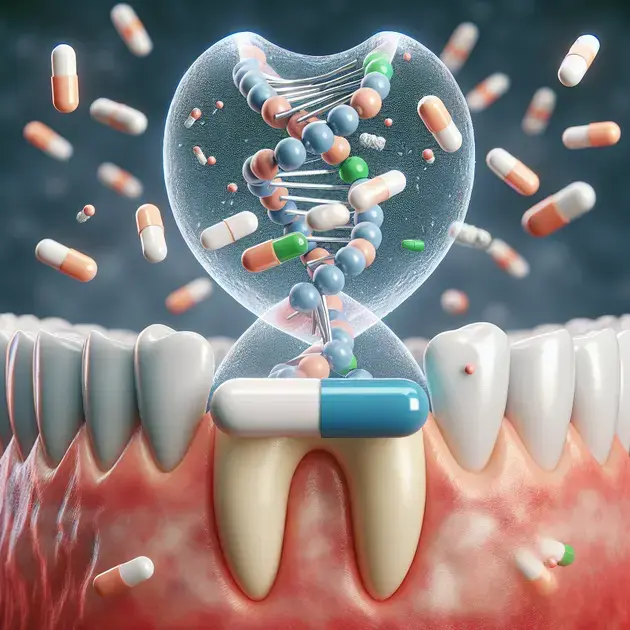When it comes to treating periodontitis, finding the most effective medication options is crucial for successfully managing this oral health condition. Periodontitis is a serious gum infection that damages the soft tissue and destroys the bone that supports your teeth. Without proper treatment, periodontitis can lead to tooth loss and other complications.
Fortunately, there are various medication options available that can help combat periodontitis and prevent its progression. From antimicrobial mouth rinses to antibiotic gels, these medications can target the bacteria causing the infection and reduce inflammation in the gums. It’s important to consult with your dentist or periodontist to determine the best medication approach for your specific case of periodontitis.

Antimicrobial Mouth Rinses: Combating Bacteria and Reducing Inflammation
Antimicrobial mouth rinses are an effective tool in the treatment of periodontitis as they help combat bacteria and reduce inflammation in the gums. To use antimicrobial mouth rinses properly, follow these steps:
Step 1:
Choose a reputable antimicrobial mouth rinse recommended by dental professionals. Look for active ingredients like chlorhexidine, cetylpyridinium chloride, or essential oils.
Step 2:
Pour the recommended amount of mouth rinse into a cup. Typically, a half-ounce to one ounce is sufficient for a rinse.
Step 3:
Swish the mouth rinse around your mouth for the recommended time, usually 30 seconds to one minute. Make sure to reach all areas, including the gum line.
Step 4:
Spit out the mouth rinse after the designated time. Avoid eating or drinking for at least 30 minutes after rinsing to allow the antimicrobial properties to work effectively.
Step 5:
Use antimicrobial mouth rinses as directed by your dentist or the product instructions, typically once or twice daily depending on the severity of your periodontitis.
Consulting with Dental Professionals: Tailoring Medication Approach to Your Needs
Consulting with dental professionals is essential in tailoring the medication approach to your specific needs when dealing with periodontitis. To effectively collaborate with your dental team, consider the following steps:
Step 1:
Schedule a comprehensive dental examination with your dentist to assess the severity of your periodontitis and discuss treatment options, including medication.
Step 2:
Be transparent about your medical history, including any allergies or previous medication reactions, to ensure the prescribed medication is safe for you.
Step 3:
Discuss any current medications you are taking to prevent potential interactions with the prescribed periodontitis treatment.
Step 4:
Follow your dentist’s recommendations regarding the type of medication, dosage, and duration of treatment. Ask any questions or express concerns you may have during the consultation.
Step 5:
Schedule regular follow-up appointments with your dental professional to monitor the effectiveness of the medication and make any necessary adjustments to your treatment plan.
Preventing Progression: Understanding the Importance of Medication in Periodontitis Management
Preventing the progression of periodontitis is crucial for maintaining oral health, and understanding the importance of medication is key in effective management. To prevent progression effectively, consider the following steps:
Step 1:
Adhere to the prescribed medication regimen provided by your dental professional to control bacterial growth and inflammation in the gums.
Step 2:
Practice good oral hygiene habits, including brushing twice a day, flossing daily, and using antimicrobial mouth rinses as recommended to complement the medication treatment.
Step 3:
Maintain regular dental check-ups to monitor the progress of your periodontitis and address any concerns or symptoms promptly with your dental team.
Step 4:
Avoid smoking and consume a balanced diet rich in nutrients to support gum health and overall immune function, enhancing the effectiveness of medication in periodontitis management.
Step 5:
Educate yourself about periodontitis and the role of medication in its treatment to make informed decisions and actively participate in your oral health care journey.

Tailored Solutions for Advanced Periodontitis Treatment
When it comes to advanced periodontitis treatment, tailored solutions are essential to address the specific needs and challenges that patients may face. These customized approaches take into account factors such as the severity of the condition, the patient’s overall health, and their individual preferences. By personalizing treatment plans, healthcare providers can optimize outcomes and improve the overall experience for patients.
One of the key aspects of tailored solutions for advanced periodontitis treatment is the use of advanced diagnostic tools and techniques. By leveraging technologies such as digital imaging, 3D scanning, and genetic testing, healthcare providers can gain a deeper understanding of the underlying causes of the condition and tailor their treatment approach accordingly. This personalized approach allows for more targeted interventions and better outcomes for patients.
In addition to advanced diagnostics, personalized medication approaches play a crucial role in the treatment of advanced periodontitis. By identifying the specific bacteria or pathogens responsible for the infection, healthcare providers can prescribe targeted medications to effectively combat the infection and promote healing. This precision medicine approach minimizes side effects and improves the overall efficacy of the treatment.
Furthermore, tailored solutions for advanced periodontitis treatment often involve a multidisciplinary approach, where specialists from different fields collaborate to provide comprehensive care. This team-based approach ensures that patients receive the best possible treatment for their unique needs and conditions. By combining expertise from various disciplines, healthcare providers can offer personalized treatment plans that address all aspects of the condition.
In conclusion, tailored solutions for advanced periodontitis treatment are a key component of modern healthcare practices. By customizing treatment plans, leveraging advanced diagnostic tools, and utilizing personalized medication approaches, healthcare providers can optimize oral health outcomes and enhance the overall patient experience. This personalized approach not only improves treatment outcomes but also empowers patients to take an active role in their own healthcare journey.
Optimizing Oral Health with Personalized Medication Approaches
Optimizing oral health through personalized medication approaches is a cutting-edge strategy that holds great promise for enhancing the treatment of periodontal conditions. By tailoring medications to individual patients based on their unique needs and genetic makeup, healthcare providers can achieve more effective and targeted results. This approach represents a significant advancement in periodontal care and offers new possibilities for improving patient outcomes.
One of the key benefits of personalized medication approaches is the ability to target specific pathogens or bacteria responsible for periodontal infections. By identifying the precise cause of the infection, healthcare providers can prescribe medications that are specifically designed to combat these pathogens, leading to more successful treatment outcomes. This targeted approach minimizes the use of broad-spectrum antibiotics and reduces the risk of antibiotic resistance.
Moreover, personalized medication approaches can help address the individual characteristics of each patient’s condition, such as their inflammatory response and healing capacity. By analyzing genetic factors and biomarkers, healthcare providers can tailor medication regimens to optimize the body’s natural healing processes and promote tissue regeneration. This personalized approach not only improves treatment outcomes but also enhances the overall experience for patients.
Another significant advantage of personalized medication approaches is the potential for reducing side effects and complications associated with traditional treatment methods. By customizing medications to suit each patient’s unique profile, healthcare providers can minimize adverse reactions and ensure greater tolerability of the treatment. This personalized approach improves patient compliance and satisfaction, leading to better long-term oral health outcomes.
In conclusion, optimizing oral health with personalized medication approaches represents a paradigm shift in periodontal care. By tailoring medications to individual patients, targeting specific pathogens, and minimizing side effects, healthcare providers can enhance treatment efficacy and improve patient experiences. This personalized approach not only benefits patients in the short term but also contributes to the advancement of precision medicine in periodontal care.
Conclusion
The tailored solutions for advanced periodontitis treatment highlighted in this blog post emphasize the importance of personalized approaches in addressing the specific needs of patients facing this condition. By considering factors such as disease severity, overall health, and individual preferences, healthcare providers can optimize outcomes and enhance the patient experience. Utilizing advanced diagnostic tools like digital imaging, 3D scanning, and genetic testing allows for a deeper understanding of the root causes of periodontitis, leading to more targeted interventions and improved results.
Personalized medication approaches play a critical role in combatting advanced periodontitis by targeting specific bacteria or pathogens responsible for infections. By tailoring medications to individual patients, healthcare providers can effectively treat the infection, promote healing, and minimize side effects. This precision medicine approach not only enhances treatment efficacy but also reduces the risk of antibiotic resistance, benefiting both short-term and long-term oral health outcomes.
The multidisciplinary nature of tailored solutions for advanced periodontitis treatment, involving collaboration among specialists from various fields, ensures comprehensive care tailored to each patient’s unique needs. This team-based approach results in personalized treatment plans that address all aspects of the condition, further optimizing oral health outcomes and patient satisfaction. In conclusion, the integration of personalized medication approaches represents a significant advancement in periodontal care, offering promising possibilities for improving patient outcomes and contributing to the evolution of precision medicine in oral healthcare.



